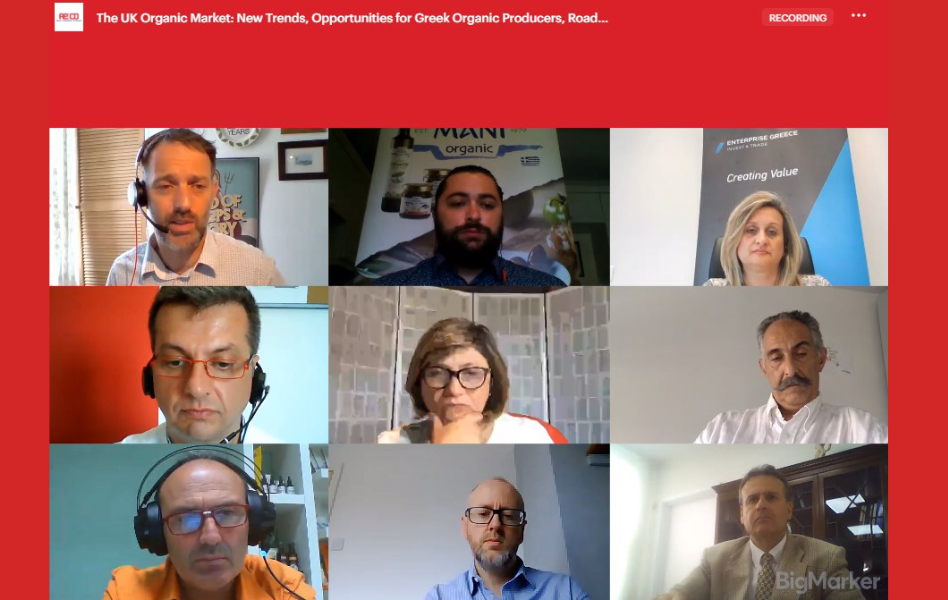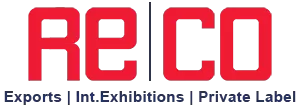How will Greek products enter British shelves? – FnB Daily

How will Greek products enter British shelves? - FnB Daily
The new trends in the British organic market and the opportunities for Greek businesses in the food and beverage sector were discussed at the event organized by RECO.
It is noted that sales of organic foods and beverages in the United Kingdom increased by 4.5% in 2019, reaching record levels of £2.45 billion and expected to exceed £2.6 billion by the end of 2020, translating into monthly markets of £200 million for organic foods and beverages.
It was emphasized in the discussion that as a market with high consumption of organic products, and with further demand due to COVID-19, the United Kingdom is an extremely important market for the F&B sector, as well as strategically significant for Greece’s agri-food sector.
LEE HOLDSTOCK: WINNING OVER… SKEPTICAL BRITONS
According to Lee Holdstock, senior business & trade development manager at Soil Association, the most pressing issue for organic products in the country amidst Brexit processes is labeling, with companies undergoing a rebranding of their products.
He also highlighted the skepticism that characterizes the British towards products, citing that the United Kingdom ranks 2nd globally in the Mistrust Index.
He confirmed, however, that the organic market will increase its growth rates due to COVID-19 not only this year but also in the coming years. He mentioned that in May it was running at a rate of 6.1%, almost double the speed of the food sector (3.3%), with some products recording strong double-digit numbers such as organic wine (+50%). He also mentioned the growth of online sales, up 11.2%, more than double last year.
He also substantiated his positive forecasts for the future of the sector in the coming years, noting that major retailers in the country realize that the current crisis is completely different from that of 2008 and they no longer see organic products as premium – which they had limited back then – as they are now essential choices for consumers.
AL OVERTON: WE TRADE BRANDS, NOT COMMODITIES
Al Overton, buying director of the supermarket chain specializing in organic products, Planet Organic – which has 8 stores around London and added another 7 since March following the acquisition of As Nature Intended – mentioned that the new trends in the post-Covid-19 era include an increase in online shopping, contactless payment solutions, food delivery, and increased demand for fresh products (meat, eggs, vegetables, etc.).
He added, however, that “we don’t know what the new normal will be after the pandemic,” but regarding the strategy his company follows, he emphasized that “we are retailers of brands, not commodities. Few companies have the whole package, i.e., brand, labeling, and proper pricing.”
Regarding the presence of Greek organic products on British supermarket shelves, he stressed that they mainly include:
• Dairy products (highlighting kefir as a trend of the era)
• Olive oil
• Olives
• Antipasti
To enable Greek organic producers to enter the shelves, according to Al Overton, they need to emphasize:
• Quality
• Variety
• Service & experience
• Price
He also added that they must focus on packaging and price to convince the British consumer to buy it for the first time, but the product still needs to have high quality and attractive taste to convince them to buy it again. They need to focus on health and well-being and simple logistics.
He noted that there are about 6,000 organic products on the chain’s shelves, but every year they do delisting, so continuous effort is needed from producers to have a permanent position.”
MISCHA MATTHEWS-HILL: WHERE GREEK PRODUCERS SHOULD EMPHASIZE
Mischa Matthews-Hill, UK Sales Manager for the Greek products Mani Blaeuel and Kourellas, made interesting remarks about the challenges Greek producers face when entering the British market.
With almost 16 years of experience in organic products, he noted that the British market is both fascinating and difficult for Greek producers to penetrate. Retailers receive dozens of calls daily from companies wanting to place their products on the shelves. He emphasized that success depends not only on quality but also on other factors such as branding, appearance, storytelling, and logistics.
He stressed that Italians and Spaniards excel in these areas compared to Greeks, although there has been improvement in recent years. Regarding logistics, he highlighted the demands of retailers for smooth and timely product transportation, which is challenging for a country as distant as Greece compared to the competition.
Regarding the characteristics a Greek company must have to enter the UK market, he noted the need for great patience and the necessity to first gain the trust of British retailers. He emphasized, “It took us about three years of continuous work before some retailers were convinced to put certain quantities on their shelves, especially due to the financial problems our country has faced in recent years, which influenced public opinion.” Once the products are on the shelves, even greater effort is required to maintain their presence.
He specifically mentioned, “We invested about €15,000 to avoid… delisting.” Besides patience and persistence, Mischa Matthews-Hill underscored the importance of “finding the market for your product, which means finding a distributor, sales agent to understand how the British market works,” adding that “it’s a fast-moving market where the shopping basket changes daily.”
KOSTAS PAPADOPOULOS: READY TO ENTER WITH NEW YOGURTS
Kostas Papadopoulos, CEO of Bioagros, considers the British market one of the most important for organic products, as Britons prioritize quality over price. However, he admitted it’s a highly challenging market where meticulous planning at a high level is essential to enter successfully.
He emphasized the need for careful moves and finding the right partners who understand consumer preferences. Regarding products, he stressed the importance of creating products that appeal to consumers, focusing on flavors, packaging, etc.
He revealed that the company has focused heavily on the yogurt sector, a popular product in the country, noting that “after at least two years of research, we are in the final stages of introducing our new yogurts to the British market,” a timeline set for late 2020 to early 2021.
Overall, he believes many Greek companies have products with good ingredients and packaging and will have opportunities to enter the UK market post-pandemic.
DIMITRIS DIMITRIADIS: CAPITAL ESSENTIAL FOR INVESTMENTS & EXPORTS
Dimitris Dimitriadis, General Manager of DIO, the Organization for the Control and Certification of Organic Products, stated that Greece was among the first countries to enter the organic industry. He highlighted the example of olive oil, where Greece produced 300 tons of organic products in 1996 when Italy had none.
However, in the following years, Italians dominated the market due to their suitable commercial channels. According to Dimitriadis, the most critical aspect for companies operating in organic product production is having capital, necessary for investments in new methods and exports, as mere presence at some exhibitions is insufficient.
Regarding DIO, he mentioned that a platform has been created to support certified companies, aiming to promote their products.
BETTY ALEXANDROPOULOU: ENTERPRISE GREECE’S STRATEGY
Betty Alexandropoulou, Advisor and Board Member of Enterprise Greece, emphasized the significance of the British market for Greek exporters, with the organization focusing on building the Greek brand and informing the British public about the approximately 30,000 organic producers in the country.
Additionally, she continues to support every company in promoting its products, focusing on digital initiatives, participating in exhibitions, food tastings, and presentations, and providing continuous updates on opportunities related to financial support for companies through relevant community financing tools.


